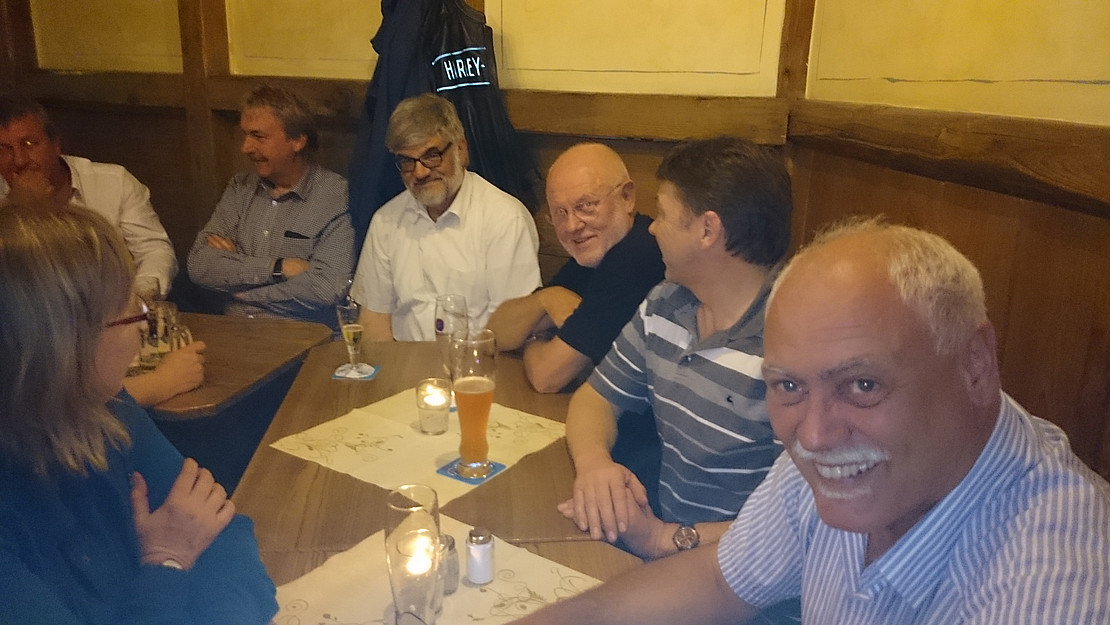This page contains automatically translated content.
Beyond the study programme
 Image: private
Image: privateIn 1980, the University of Kassel was still called Gesamthochschule, the German Chancellor was Helmut Schmidt, the Green Party was founded, John Lennon was shot - and Michaela Claus, Harald Strack and Günther Ziegler began their electrical engineering studies in Kassel. Together with their fellow students, they have managed to do something that only very few do: stay in touch after graduating and meet up once a year for a regulars' get-together.
Harald Strack and Günther Ziegler are the initiators of the regulars' table, which actually started back in their student days: "During our studies, we met in study groups to learn the lecture content and cram for exams or tests," explains Günther Ziegler. But breaks were also important: "There was the odd round of Doppelkopf in between," laughs Harald Strack.
The newly graduated engineers didn't want to miss out on these rounds even after finishing their studies in 1985 and so a regulars' table was set up. A small group of seven or eight men initially met once a month in the "Zwylle" in Goethestraße. Over time, an annual meeting developed, which has since found a permanent location in the "Komödienstadl". The members changed, contacts broke off, new ones were made, addresses were exchanged. Michaela Claus is the only woman at the regulars' table: "I already know this from my studies, because even back then I was the only female student in my year," she says.
It is thanks to Harald Strack and Günther Ziegler that the tradition is being continued: "It is important that someone takes the initiative," explains Harald Strack. Around 20 alumni get together every year. Some live in Kassel or the surrounding area, others have moved far away. But they like to come back to their place of study for the regulars' table. They studied under such renowned figures as Werner Kleinkauf, the co-founder of SMA, or Heinz Theuerkauf. Today, sustainability research characterizes the university's profile, but even back in the 1980s, electrical engineering students were researching systems for the development of renewable energies, for example.
The students began their studies in 1980 with a special feature: they were the first year of the integrated electrical engineering course. The comprehensive university at the time placed great importance on the practical relevance of the degree courses. "We didn't just study in the lecture hall, but also in workshops and laboratories," remembers Harald Strack. Together with a fellow student, he developed an innovative system to improve battery quality. The electrical engineering students also had to complete two so-called BpS semesters. "The practical vocational studies were very helpful for us in finding out what we wanted to focus on during our studies and in which direction we wanted to go professionally," says Günther Ziegler. The fellow students started their careers in very different ways. While Günther Ziegler and Harald Strack quickly found a good job, working life was more difficult for Michaela Claus and she had to change jobs more frequently. This is why today she gives a voice to the interests of female engineers and is committed to equal opportunities in the "Network Women in the Engineering Profession" of the "Association of German Engineers". She is organizing a major conference for the "German Association of Women Engineers", which will take place next year at the University of Kassel.
Close friendships
The regulars' table is rarely about the profession and technical content. Instead, the focus is on memories of their studies and the former fellow students tell each other funny or thought-provoking anecdotes. "Over the years, close friendships have developed," says Harald Strack, "we also do things independently of the annual meetings." As many of them are now retired after a long working life, there is more time for this again.
An anniversary is coming up next spring, when they will have graduated from the GhK forty years ago. Michaela Claus has an idea: "We could make an appeal in our group and collect photos - from our studies and from our regulars' tables."
This article appeared in the university magazine publik 2024/3. Text: Kathrin Meckbach.